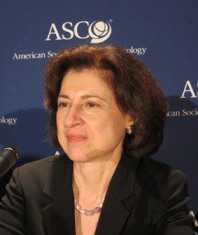疾病进展后使用贝伐珠单抗可延长转移性结直肠癌患者生存
2012-06-05 不详 网络
芝加哥(EGMN)——美国临床肿瘤学会(ASCO)年会上报告的一项研究显示,对于进展期结直肠癌(CRC)患者,在二线化疗基础上追加贝伐珠单抗可延长无进展生存期和总生存期。 德国Eppendorf大学医院Hubertus Wald肿瘤中心主任Dirk Arnold博士报告,在这项III期随机试验中,820例无法切除的转移性CRC患者在接受伊立替康或奥沙利铂为基础的一线化疗后,根据医
芝加哥(EGMN)——美国临床肿瘤学会(ASCO)年会上报告的一项研究显示,对于进展期结直肠癌(CRC)患者,在二线化疗基础上追加贝伐珠单抗可延长无进展生存期和总生存期。
德国Eppendorf大学医院Hubertus Wald肿瘤中心主任Dirk Arnold博士报告,在这项III期随机试验中,820例无法切除的转移性CRC患者在接受伊立替康或奥沙利铂为基础的一线化疗后,根据医生的判断,追加贝伐珠单抗治疗。在疾病进展时,患者随机分组接受之前未用过的二线方案治疗,加用或不加用贝伐珠单抗。主要终点为中位总生存期。
结果显示,接受贝伐珠单抗治疗和单纯化疗者的中位总生存期分别为11.2和9.8个月[危险比(HR)为0.81,P=0.0062]。接受和未接受贝伐珠单抗治疗者的中位无进展生存期分别为5.7和4.1个月(HR,0.68,P<0.0001)。接受贝伐珠单抗治疗使无法切除结直肠癌患者的总生存期和无进展生存期分别延长了1.4和1.6个月。贝伐珠单抗组和单纯化疗组的总应答率分别为5.4%和3.9%,差异无统计学意义。二线治疗中继续使用贝伐珠单抗的不良事件与贝伐珠单抗作为一线或二线治疗的历史对照相似。
这项研究为既往接受过贝伐珠单抗联合方案预治疗的疾病进展患者提供了一种新的二线治疗选择。
这项名为ML 18147的研究是由罗氏公司资助的。Arnold医生披露担任了安进、默克雪兰诺和罗氏诊断公司的顾问并接受这些公司提供的酬金,此外,Arnold医生还接受了罗氏诊断公司提供的研究资助。
CHICAGO (EGMN)–Bevacizumab extended both progression-free and overall survival when it was added to second-line chemotherapy in patients with advanced colorectal cancer, investigators reported at the annual meeting of the American Society of Clinical Oncology.
In a phase III randomized trial, patients with inoperable colorectal cancer (CRC) and disease progression following first-line chemotherapy who received bevacizumab in addition to a second-line regimen had a 1.4-month advantage in overall survival, and 1.6-month-longer progression-free survival than patients who received second-line chemotherapy alone, reported Dr. Dirk Arnold, director of the Hubertus Wald Tumor Center at University Clinic Eppendorf in Hamburg, Germany.
The findings suggest that bevacizumab, which has had mixed results in the treatment of other cancers, plays a significantly favorable role in CRC, Dr. Arnold said.
“This is the first randomized trial to prospectively evaluate bevacizumab beyond first progression. This study confirms that continuing bevacizumab beyond progression while changing chemotherapy is beneficial for patients, and has translated into a significant improvement in overall survival in metastatic colorectal cancer patients, as well as progression-free survival,” he said in a briefing.
A total of 820 patients with unresectable metastatic CRC received first-line chemotherapy with either an irinotecan-based or oxaliplatin-based regimen at the treating physician’s discretion plus bevacizumab. At disease progression, the patients were randomly assigned to second-line therapy with the regimen they did not receive up front with or without concomitant bevacizumab.
Median overall survival, the primary end point, was 11.2 months for patients who received bevacizumab, compared with 9.8 months for those who received chemotherapy alone (hazard ratio 0.81, P = .0062). Median progression-free survival was 5.7 months with bevacizumab and 4.1 months without (HR 0.68, P less than .0001).
The overall response rates were 5.4% for the bevacizumab group and 3.9% for the chemotherapy-alone group, a difference that was not statistically significant.
Adverse events with bevacizumab continued in the second line were similar to those of historical controls treated with bevacizumab in either first- or second-line therapy, Dr. Arnold said.
“This provides clearly a new treatment option in the second line for patients who have been pretreated with a bevacizumab combination regimen before,” Dr. Arnold said.
“Furthermore, I think these findings indicate that this might also serve as a new model for a treatment approach by multiple treatment lines in metastatic colorectal cancer and across other tumor types, which is currently [being] investigated in other trials,” he added.
Dr. Bruce J. Roth, a professor of medicine in the oncology section at Washington University in St. Louis, who was not involved in the study, commented that “medical oncologists have been trained to stop classic cytotoxic therapy at the time of progression, but the issue is a little bit more complicated for anti-VEGF [vascular endothelial growth factor] therapies like bevacizumab, and this issue has been raised in other tumor types.”
Dr. Roth moderated the briefing at which Dr. Arnold presented the data.
Dr. Arnold noted that the findings suggest that mechanisms of tumor resistance to cytotoxic agents may be different from those of resistance to antiangiogenic agents, which could explain the additional benefit seen with bevacizumab.
The study, ML 18147, was supported by Roche. Dr. Arnold disclosed serving in a consulting or advisory role for and receiving honoraria from Amgen, Merck Serono, and Roche Diagnostics, and receiving research funding from Roche Diagnostics. Dr. Roth had no disclosures.
本网站所有内容来源注明为“梅斯医学”或“MedSci原创”的文字、图片和音视频资料,版权均属于梅斯医学所有。非经授权,任何媒体、网站或个人不得转载,授权转载时须注明来源为“梅斯医学”。其它来源的文章系转载文章,或“梅斯号”自媒体发布的文章,仅系出于传递更多信息之目的,本站仅负责审核内容合规,其内容不代表本站立场,本站不负责内容的准确性和版权。如果存在侵权、或不希望被转载的媒体或个人可与我们联系,我们将立即进行删除处理。
在此留言












#疾病进展#
69
#患者生存#
60
#贝伐珠#
64
#转移性#
66
#结直肠#
54
#贝伐#
49